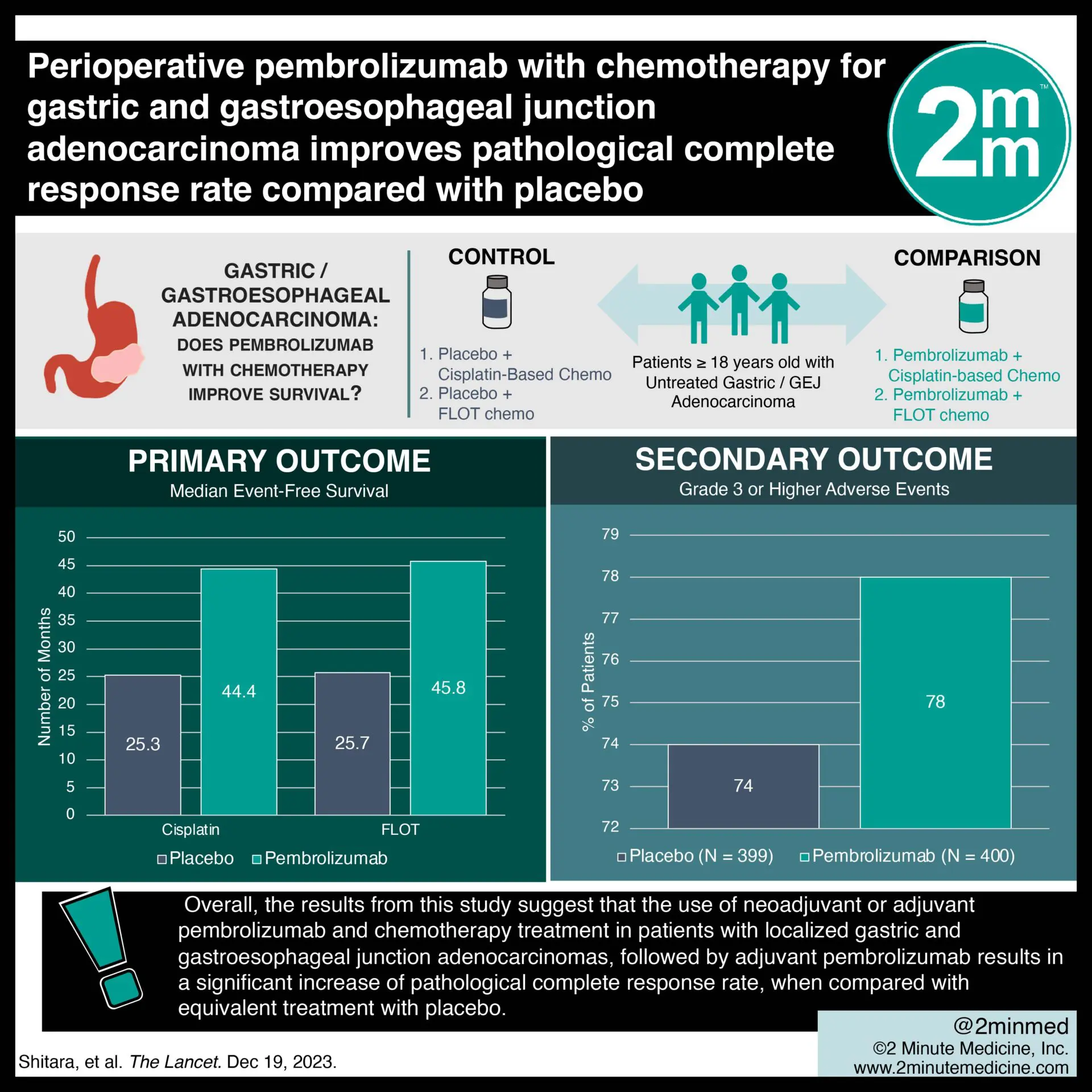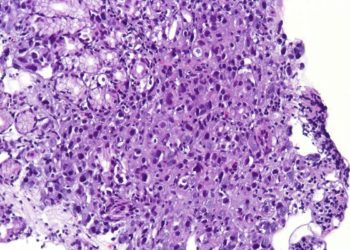#VisualAbstract: Perioperative pembrolizumab with chemotherapy for gastric and gastroesophageal junction adenocarcinoma improves pathological complete response rate compared with placebo
 1. The median overall survival and event-free survival were not statistically different in the pembrolizumab group as compared to the placebo group.
1. The median overall survival and event-free survival were not statistically different in the pembrolizumab group as compared to the placebo group.
2. The frequency of serious adverse events (AEs) of grade 3 or worse was comparable between experimental and placebo groups.
Evidence Rating Level: 1 (Excellent)
Study Rundown: While the gold standard treatment for localized gastric and gastroesophageal junction (GEJ) adenocarcinomas is surgical resection, there are high recurrence rates. As there is no standard-of-care perioperative treatment accepted worldwide, this study explored the outcomes of perioperative pembrolizumab with either cisplatin-based (main cohort) or fluorouracil, docetaxel, and oxaliplatin (FLOT)-based chemotherapy versus placebo and chemotherapy treatment on pathological complete response (pCR), overall survival (OS), and safety, measured by adverse events (AEs). Results in the main cohort for the first interim analysis revealed that more patients in the experimental group compared to the placebo group had a significant improvement in pCR. In the main cohort plus FLOT cohort, results were similar with more patients receiving experimental treatment having increased pCR. Median OS was similar in the pembrolizumab group compared to the placebo group. Most patients in both treatment arms of the main cohort experienced AEs of any type. The most severe AEs (grade 3 or worse) occurred in a comparable percentage of pembrolizumab group patients and placebo group patients. Limitations to this study include that the FLOT subgroup was not allocated to be the control group. This treatment is commonly used in some non-Asian countries. Additionally, the OS results are immature, and there is a need for continuing follow-up to accurately determine the survival benefit of using pembrolizumab. Overall, the results from this study suggest that the use of neoadjuvant or adjuvant pembrolizumab and chemotherapy treatment in patients with localized gastric and gastroesophageal junction adenocarcinomas, followed by adjuvant pembrolizumab results in a significant increase of pathological complete response rate, when compared with equivalent treatment with placebo but survival analysis remains immature.
Click to read the study in The Lancet
In-Depth [randomized controlled trial]: This phase 3, randomized, double-blind controlled trial, was completed in 143 medical centres located within 24 countries. A total of 1,007 patients were included in this study. There was a main cohort study, which was comprised of 804 patients, and a sub-set study cohort which included 203 patients. The 804 adult patients with locally advanced gastric or GE adenocarcinoma who had not been treated previously were assigned in a random 1:1 fashion into groups: pembrolizumab (n = 402) or placebo (n = 402). Each group received neoadjuvant pembrolizumab or placebo with cisplatin-based chemotherapy, surgery, adjuvant pembrolizumab or placebo with chemotherapy, and finally adjuvant chemotherapy or placebo. In the FLOT-based chemotherapy sub-study, 203 patients were randomly assigned to receive either neoadjuvant pembrolizumab (n = 100) or placebo (n = 100). Study results for the main cohort showed that 12.9% of the experimental group compared to 2% of the placebo group had a pCR (difference of 10.9%; 95% confidence interval (CI), 7.5-14.8%). In the main cohort, the median OS was 60.7 months (95% CI, 51.5-not reached) in the pembrolizumab group, compared with 58.0 months (95% CI, 41.5-not reached) in the placebo group (hazard ratio (HR), 0.90; 95% CI, 0.73-1.12). Event-free survival was numerically higher but did not reach the pre-specified significance (HR 0.81, 95% CI 0.67-0·99, p=0·0198). In the main cohort, AEs of any type occurred in almost every patient in both treatment arms (99%). Severe AEs of grade 3 or worse, occurred in 78% of the pembrolizumab group, compared with 74% of the placebo group; the most common being nausea (60% vs. 62%) and anemia (42% vs. 40%). In the pembrolizumab group, 4% of patients died of any cause compared to 2% in the placebo group. In the FLOT cohort, 91% of the pembrolizumab group and 81% of the placebo patients reported grade 3 or worse AEs.
©2024 2 Minute Medicine, Inc. All rights reserved. No works may be reproduced without expressed written consent from 2 Minute Medicine, Inc. Inquire about licensing here. No article should be construed as medical advice and is not intended as such by the authors or by 2 Minute Medicine, Inc.









